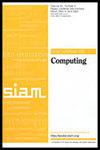论首价拍卖中均衡计算的复杂性
IF 1.6
3区 计算机科学
Q3 COMPUTER SCIENCE, THEORY & METHODS
引用次数: 0
摘要
研究了具有连续价值分布和离散竞价空间的首价拍卖中(纯)贝叶斯-纳什均衡的计算问题。我们证明了当竞标者对其他竞标者的价值分布有独立的主观先验信念时,计算拍卖的$\varepsilon$-均衡是ppad完备的,计算一个精确的均衡是fixp完备的。我们还提供了一种有效的算法来解决问题的特殊情况,对于固定数量的投标人和可用的投标。本文章由计算机程序翻译,如有差异,请以英文原文为准。
On the Complexity of Equilibrium Computation in First-Price Auctions
We consider the problem of computing a (pure) Bayes-Nash equilibrium in the first-price auction with continuous value distributions and discrete bidding space. We prove that when bidders have independent subjective prior beliefs about the value distributions of the other bidders, computing an $\varepsilon$-equilibrium of the auction is PPAD-complete, and computing an exact equilibrium is FIXP-complete. We also provide an efficient algorithm for solving a special case of the problem, for a fixed number of bidders and available bids.
求助全文
通过发布文献求助,成功后即可免费获取论文全文。
去求助
来源期刊

SIAM Journal on Computing
工程技术-计算机:理论方法
CiteScore
4.60
自引率
0.00%
发文量
68
审稿时长
6-12 weeks
期刊介绍:
The SIAM Journal on Computing aims to provide coverage of the most significant work going on in the mathematical and formal aspects of computer science and nonnumerical computing. Submissions must be clearly written and make a significant technical contribution. Topics include but are not limited to analysis and design of algorithms, algorithmic game theory, data structures, computational complexity, computational algebra, computational aspects of combinatorics and graph theory, computational biology, computational geometry, computational robotics, the mathematical aspects of programming languages, artificial intelligence, computational learning, databases, information retrieval, cryptography, networks, distributed computing, parallel algorithms, and computer architecture.
 求助内容:
求助内容: 应助结果提醒方式:
应助结果提醒方式:


